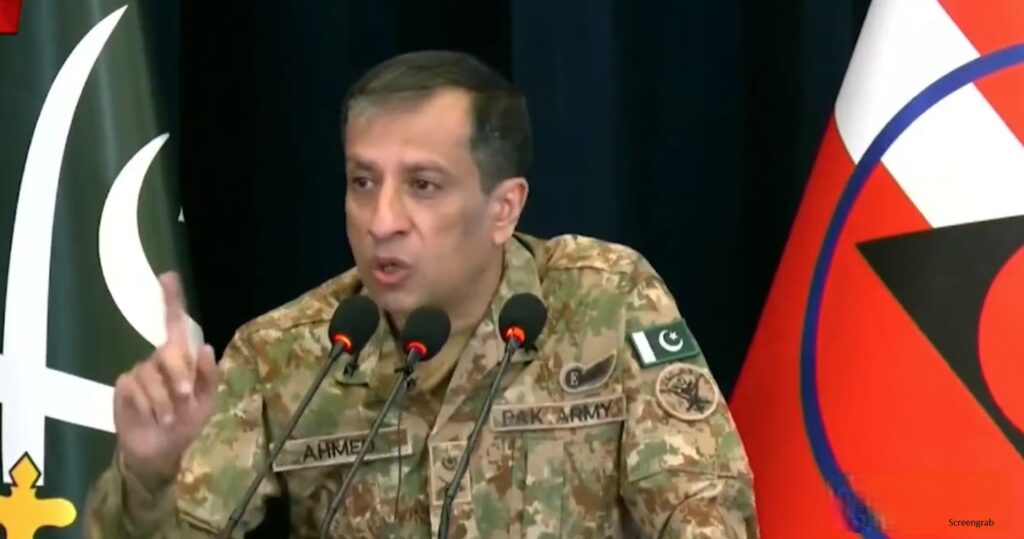Laiq Khan

Peshawar: Inter-Services Public Relations (ISPR) Director General Lieutenant General Ahmed Sharif Chaudhry on Friday criticised the Khyber-Pakhtunkhwa (K-P) government’s handling of security and warned that weak governance and incomplete implementation of the National Action Plan (NAP) are driving a resurgence of militancy in the province.
Speaking at a press conference at Peshawar Corps Headquarters, Lt Gen Chaudhry said the state could not be “left to the whims of any single person” and urged provincial authorities to focus on protecting citizens rather than “begging Afghanistan for security.” He accused a political-criminal nexus of providing shelter to militants and facilitating lawlessness that had allowed terrorism to re-emerge.
“We also hope that instead of begging Afghanistan for security, you will protect this province and its people,” he said, adding: “Appeasement of terrorists and their facilitators is never and not a policy.”
Key claims and figures presented by ISPR
- The DG ISPR blamed weak governance and failure to fully enforce the NAP — including the 2021 revised version — for a spike in terrorism, saying K-P accounts for roughly 70% of the country’s terrorist incidents.
- Security operations data highlighted by the military: in 2024, about 14,535 intelligence-based operations (IBOs) in K-P killed 769 terrorists (including 58 Afghan nationals), while 272 army and FC personnel, 140 policemen and 165 civilians were martyred.
- In 2025 (to Sept 15), 10,115 IBOs reportedly killed 970 terrorists and saw 311 army personnel martyred. Nationwide figures cited: 57,320 IBOs in 2025, with 70.5% of terrorist incidents recorded in K-P.
- The DG said 917 of 1,422 terrorists killed nationwide were eliminated in K-P this year.
Afghanistan, foreign fighters and weapons
Lt Gen Chaudhry accused elements operating from Afghan soil of facilitating attacks in Pakistan and said there was evidence of “terrorist sanctuaries” across the border. He reiterated Pakistan’s long-standing demand that Afghan authorities prevent their territory from being used by non-state actors.
“We only say one thing to the Afghan government: do not allow your soil to be used for terrorism against Pakistan,” he said, while noting Pakistan’s continued trade and humanitarian links with Afghanistan.
The military spokesperson also claimed US-supplied equipment abandoned after the 2021 US withdrawal was now in the hands of militants and being used in attacks inside Pakistan.
Judicial, governance and policy criticisms
Addressing the role of state institutions, Lt Gen Chaudhry criticised the judicial system and political handling of counter-terrorism:
- He said courts had recorded zero convictions in many counter-terrorism (CT) cases and highlighted 4,683 CT cases pending — arguing a weak judicial process undermines NAP objectives.
- He lamented the politicisation of repatriation of Afghan refugees and alleged that opposition to measures such as sealing portions of the Pak-Afghan border served illicit trade interests.
- Referring to the revised NAP (labelled Vision Istehkam), he urged full implementation of its 14 points, from kinetic operations to curbing terror financing, regulating seminaries and strengthening CT case follow-up in courts.
Operations, accountability and militants named
Lt Gen Chaudhry displayed visuals and named militant figures he said remained active or had been targeted, including senior TTP leaders. He repeated that security forces would respond firmly to facilitators and urged those involved to surrender or cooperate.
On internal accountability, he confirmed that a former DG ISI is facing court-martial proceedings, stressing the importance of due process and saying military internal inquiries proceed on facts and evidence.
On collateral damage and local criticism
Responding to questions about civilian harm during operations, he said the military conducts “intelligence-based and very precise” actions and rejected assertions that operations amounted to unjustified collateral damage.
Ten takeaways (as outlined by DG ISPR)
- The state cannot be left to any single individual’s whims.
- Politics must not be placed above the state.
- Facilitators based in Afghanistan will face a firm response.
- The status quo of weak governance and impunity will not continue.
- A political-criminal nexus is enabling terrorism in K-P.
- Smuggling narratives are protecting illicit trade and opposing repatriation.
- Full implementation of the NAP is necessary to end militancy.
- A unified anti-terror narrative is required across politics, media and society.
- A former ISI chief is undergoing court-martial proceedings (process ongoing).
- Terror bases across the border remain a threat to Pakistan’s security.
Reaction and context
The DG’s comments follow a period of rising attacks in parts of K-P and renewed public debate over the roles of governance, judicial follow-up on CT cases and cross-border militancy. Islamabad has previously engaged Afghanistan’s interim authorities and international partners on the issue; Pakistani officials have repeatedly called for “decisive and verifiable” action from Kabul against groups such as the TTP and BLA.
What the DG did not confirm
When asked about specific reports of strikes in Kabul or allegations of direct Pakistani action across the border, Lt Gen Chaudhry declined to confirm operational details, saying only that Pakistan engages Afghanistan at multiple levels and that the state would take necessary steps to protect its people.























